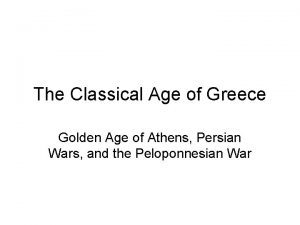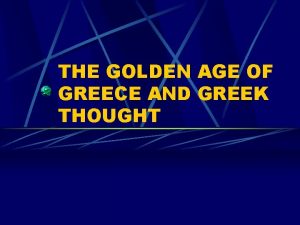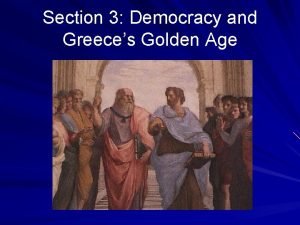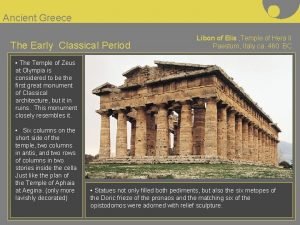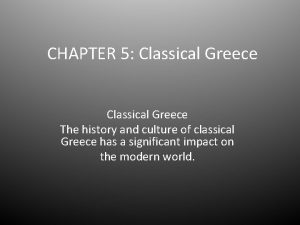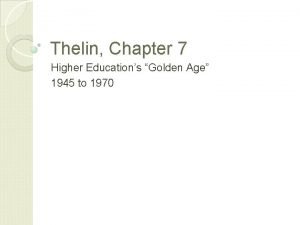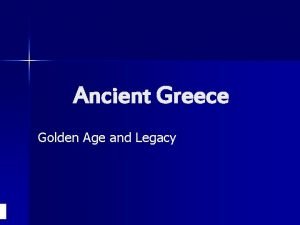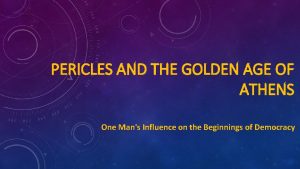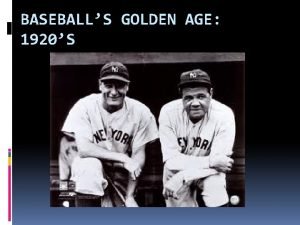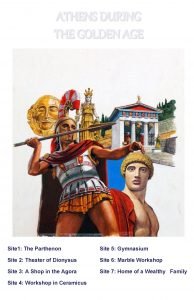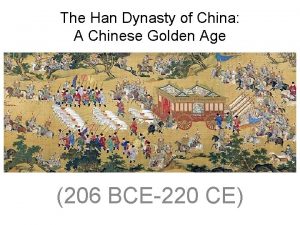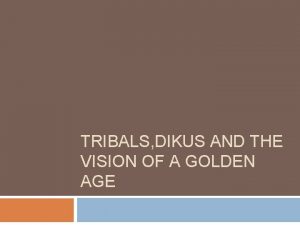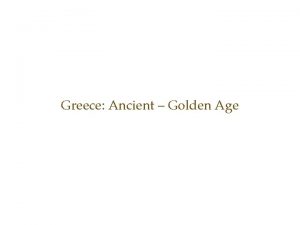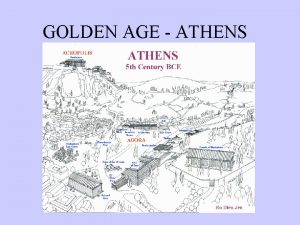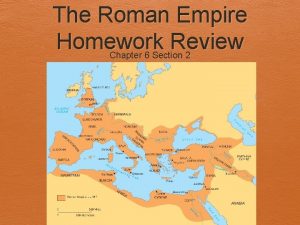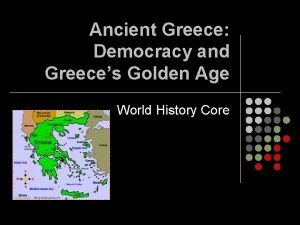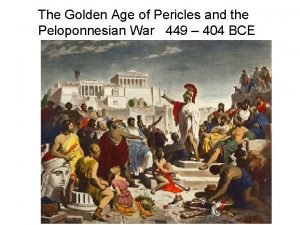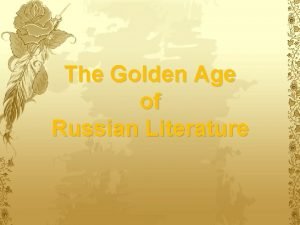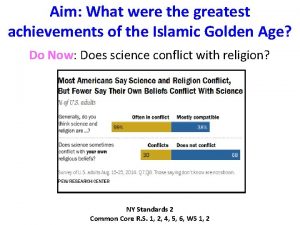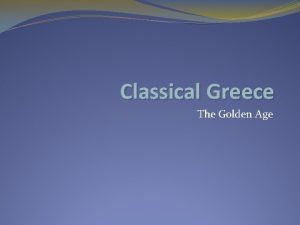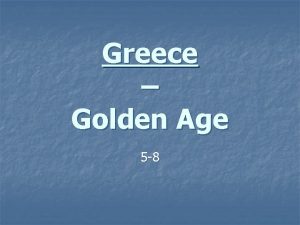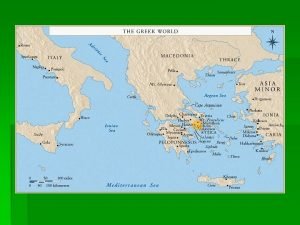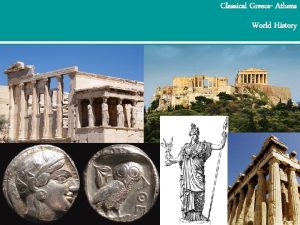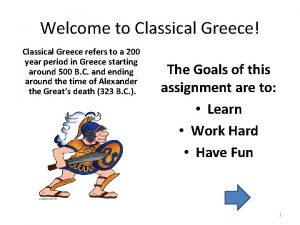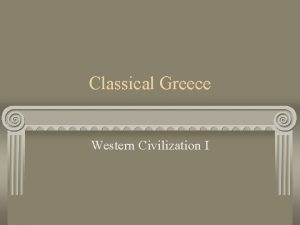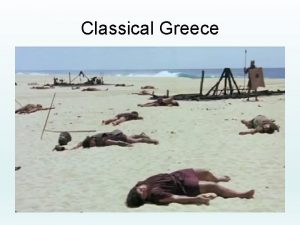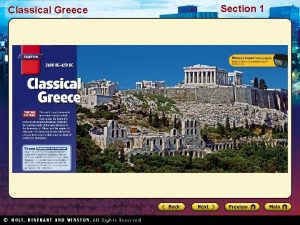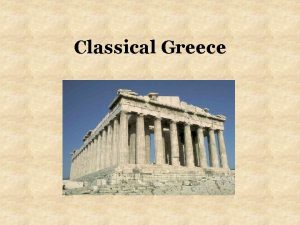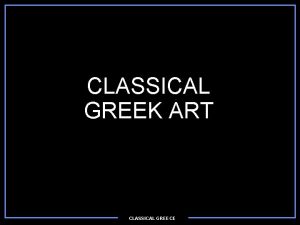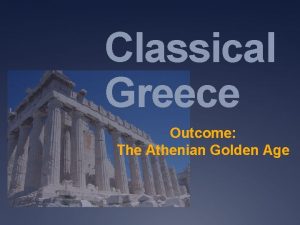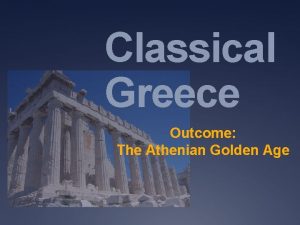Classical Greece Golden Age the height of a




































- Slides: 36

Classical Greece Golden Age the height of a civilization’s intellectual accomplishment and economic productivity

Golden Age of Athens • Pericles—leader of Athens (461 -429 BCE) • 3 Goals for Athens Strengthen Athenian democracy Hold and strengthen the empire Glorify Athens

Glorifying Athens • Wealth was used to beautify Athens. • The Parthenon – built to honor Athena, goddess of wisdom & protector of Athens • Sculptures- “serenity” & “grace. ” Classical art

Perfection and Balance in Philosophy

• The philosophers at this time believed that truth could be determined through rational thought and deliberate and careful observation, and that virtue and the search for goodness would lead to internal peace and happiness.

Socrates (469 -399 BCE) • Born in moderate wealth; never wrote anything; wisest man of all time? • Socratic Questioning – allows student to arrive at own conclusions by asking questions! • Socrates had a goal of realizing perfect and ethical human behavior and teaching that to his students

Socrates on Trial • Charged with corrupting the youth and impiety (not respecting sacred things). • The outcome of the trial was voted on (what city was the trial likely in? ? ) The verdict? ? Death by poison

Plato • denounced democracy because of the death of Socrates • wants to create the perfect government A philosopher king • Established first institution of higher learning

Aristotle • Tutored Alexander the Great (Macedonian King) • Why did he leave Greece? • Perfect human path = moderation • “golden mean” – desirable goal between two extremes (one being excess the other being deficiency)

• http: //www. dailymotion. com/video/x 2 md 4 h 3

Philosophy n Greek philosophers, or "lovers of wisdom, " used observation and reason to study and QUESTION the world around them.

Perfection and Balance in Architecture

Architecture Parthenon—Dedicated to Athena Buildings dedicated to gods and goddesses




part of Parthenon frieze

• Created columns to support their buildings

Perfection and Balance in Art

Pre-Classical Greek statue

idealism state of perfection


Ideal, Not Real

Perfection and Balance in History

Herodotus • “Father of History” • objectivity – eliminating bias or favoritism • reported on Greco. Persian Wars • Gather multiple sources and write a narrative

Perfection and Balance in Theatre

• drama myths) (based on ie. Hercules (goal to become a god – perfection) ie. Oedipus (sleeps with mother and disturbs perfect bloodline) • tragedy • comedy voice amplification and anonymity

Alexander the Great 356 -323 B. C. E.

How a Young Man became SO Great • 20 Years old when he became king • Under Aristotle’s teaching, Alexander learned science, geography, and literature. • He especially enjoyed Homer’s description of the heroic deeds performed by Achilles during the Trojan War. • To inspire himself he kept a copy of the Iliad under his pillow!

Alexander the Great in Persia • Alexander wants to carry out his father’s plan of invading Persia • Leading his troops into battle, Alexander smashed the Persian defenses. • Shaken by his defeat, Darius III (king of Persia) tried to negotiate a peace settlement. He offered him half of his lands…but Alexander wanted all.

Alexandria • The Egyptians welcomed Alexander and they crowned him Pharaoh. • During his time in Egypt he founded the city of Alexandria at the mouth of the Nile. • After leaving Egypt he moved East into Mesopotamia

Alexander the Great’s Empire

What a Great Death • After conquering so much territory, Alexander planned to unify his empire. • Unfortunately he became seriously ill with a fever and died a few days later at the age of 32. • After Alexander died, his Macedonian generals fought among themselves for control of his empire. • It was divided among 3 men. Ignoring democratic traditions of the Greek polis, these rulers and their descendants governed with complete power over their subjects. • A vibrant new culture emerged from the blend of Greek and Eastern customs.

Hellenistic Culture • Alexander’s ambitions were cultural as well as military and political. He actively sought to meld the conquered culture with that of the Greeks. • As a result a vibrant new culture emerged. This blending with Egyptian, Persian, and Indian influences became known as Hellenistic culture.

Library at Alexandria (333 BCE) First True research library in the World.

The Breakup of Alexander’s Empire
 Golden age of greece
Golden age of greece Golden age of greece drama
Golden age of greece drama Greek golden age
Greek golden age Democracy and greece's golden age
Democracy and greece's golden age Iron age bronze age stone age timeline
Iron age bronze age stone age timeline Iron age bronze age stone age timeline
Iron age bronze age stone age timeline Tvu of level crossing
Tvu of level crossing Classical period greece
Classical period greece Lesson 3 classical greece
Lesson 3 classical greece Chapter 5 ancient greece
Chapter 5 ancient greece Golden ratio and golden rectangle
Golden ratio and golden rectangle The golden ratio
The golden ratio Name age height weight
Name age height weight How to read a growth chart
How to read a growth chart Golden age of hollywood 1930s
Golden age of hollywood 1930s The golden age chapter 7
The golden age chapter 7 Dba fanaticus
Dba fanaticus Golden age greek mythology
Golden age greek mythology Weimar golden age
Weimar golden age Pericles and the golden age of athens
Pericles and the golden age of athens Age of history
Age of history India's golden age
India's golden age Athens during the golden age
Athens during the golden age Han dynasty golden age
Han dynasty golden age Comics types
Comics types World history patterns of interaction
World history patterns of interaction Tribals dikus and the vision of a golden age
Tribals dikus and the vision of a golden age Persian empire golden age
Persian empire golden age During the golden age of athens, a tribute was
During the golden age of athens, a tribute was Golden age of the roman empire
Golden age of the roman empire The golden age (1939-1956)
The golden age (1939-1956) Golden age of tang and song dynasties
Golden age of tang and song dynasties Greeces golden age
Greeces golden age Peloponnesian war
Peloponnesian war The golden age of russian literature
The golden age of russian literature Why were the tang and song dynasties golden ages
Why were the tang and song dynasties golden ages What are the key achievements from the islamic golden age
What are the key achievements from the islamic golden age
